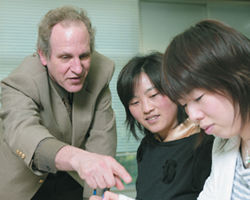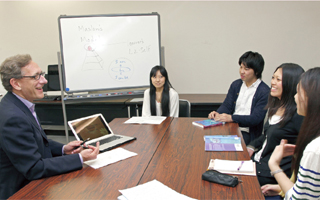- HOME
- DEPARTMENTS
- Graduate School
- Division of Foreign Languages
Division of Foreign Languages
Acquiring specialized knowledge and simultaneously fostering advanced language proficiency
The Division offers systematic and effective academic programs, fostering advanced language proficiency and deep understanding of its culture and historical background, as well as necessary specialized knowledge to conduct high-quality Master’s Thesis (or Research Report) that serves as the foundation for a future career.
English Course
Curriculum on English Language Education and Related Fields
English Course Graduate Program Description
Discussion-focused Courses in English
In order to acquire specialized knowledge, research methodology, organizational, analytical, problem-solving ability, and advanced English proficiency simultaneously, in all graduate courses, we continuously train our graduate students to accurately grasp texts written in English, with regard to its content and arguments.
Offering “Special Tutorial Seminars”
The Course offers “Special Tutoring Seminars,” attempting to function as supplemental “Research Supervision” courses and to enhance the quality of the Master’s Theses. When a graduate student’s research theme pertains to two disciplines (e.g., “English Education” and “Applied Linguistics”) and they wish to obtain guidance by multiple faculty members, or related courses are not offered, graduate students are able to appoint faculty members and specify the course theme.
Offering Field Research on English Education Courses in Japan and Abroad
The English Course offers off-campus learning, “English Education Field Research in a Foreign Country” at Swinburne University of Technology, in Melbourne, Australia and “English Education Field Research in Japan” at Kyoto Sangyo University Junior/Senior High School. Under the guidance of a faculty advisor, students conduct their research, deepen field-specific issues and explore solutions.
Chinese Course
Rich Curriculum to Learn Chinese Linguistics and East Asian Cultures
The purpose of Chinese Course is to consider languages and culture in East Asia, based on systematic knowledge of Chinese linguistics. The Course offers diverse courses to prepare our students to engage in careers in their specialized field. Our leading faculty members in the research field support our graduate students over the process of selecting a theme, conducting research, and completing their graduate thesis.
Chinese Course Graduate Program Description
Languages, Culture, and Practical Research
Graduate students conduct their research on diachronic and synchronic research on Chinese linguistics,Chinese culture, and Japan-China comparative cultural research. In the linguistics area, we work on contemporary Chinese lexicology, grammar, Chinese language and the history, phonology, dialectology, Chinese ethno-linguistics, Japanese-Chinese comparative research, and the history of interactions in East Asian written languages. In the cultural research area, we work on Chinese cultural research and Japan- China comparative cultural research. In response to the practical demand for judicial interpreters, we offer a “Research in Chinese Interpretation and Translation” course.
One-to-one Supervision by Leading Scholars
Graduate students are supervised on a one-to-one basis by leading scholars. Assignments are structured to build from the basics up to specialized knowledge, fostering logical and analytical abilities. We have an unmatched productive research environment with Professor Ogawa’s collection (donated by Professor Emeritus Ogawa, Kyoto University and Professor of Kyoto Sangyo University) at the Library.
Linguistics Course
Linguistics Research from Multidimensional Perspectives
Our approaches to linguistics comprise of phonology, grammar, semantics of respective languages, common theory on human languages, inquiry into principles, and literature studies using language materials to understand “culture” deeply. For international students, we will conduct research in both the Japanese language as well as contrastive studies between Japanese and the student’s native language.
Linguistics Course Graduate Program Description
Faculty Members in Various Areas of Study
Linguistics courses are run by 12 faculty members in total, and 5 members provide supervision of Master’s thesis. Our faculty members’ specialized languages are from all around the globe. Research areas of our faculty members include not only language research and general linguistics, but also applied linguistics and philology.
Multi-faceted Supervision according to Student’s Research Theme
Graduate students receive supervision on a one-to-one basis from the faculty members in a wide variety of fields and languages, depending on students’ research areas of interest. Our faculty members provide instruction not only in research areas for graduate students, but also in languages necessary to read academic articles in related fields.







